For most of us May Day (not to be confused with the international distress call mayday) just means a bank holiday and a chance to recharge our batteries. Perhaps an opportunity to visit a museum? Or maybe surf the net for interesting and informative blogs?. . .
The earliest May Day celebrations date back to pre-Christian times. In ancient Rome they would celebrate Florialia at the end of April, honouring Flora, the Goddess of flora (funnily enough) and fertility. Meanwhile the Celts celebrated the Pagan festival of Beltane half way between the spring Equinox and the Summer Solstice. For centuries people across Europe have marked, in one way or another, the arrival of new life in Spring. Gradually, as the continent became more Christian, these Pagan rites took on a more secular guise but the traditions of crowning a May Queen, the Maypole and Morris dancing still hark back to these ancient celebrations.
One of the earliest depictions of the holiday from our collections (from around 1540) is this charming leaf from a book of hours. These books, which were often exquisitely decorated, were private Christian books of devotion listing a calendar of the Psalms and prayers to be followed and performed throughout the days of the year. This page is for the month of May and we can see a boat trip with musicians, a floral procession and the whole town dancing in the square. A depiction of a ‘Pagan’ festival in this most Christian devotional context is perhaps a little surprising and shows just how far removed the festival had become from its roots.

Simon Bening c. 1540
Watercolour on Velum
Museum no. E.4575-1910 Part of the Salting Bequest © Victoria and Museum, London
The next representation we have of May Day merrymaking is the oil painting ‘The Milkmaid’s Garland [or] The Humours of May Day’. This was one of 53 paintings designed by Francis Haymam for the supper boxes of Vauxhall Pleasure Gardens. Here we see three jaunty milk maids taking to the streets of London in a processional tradition that lasted until the early 19th Century. Laden with borrowed silverware and spruced with ribbons and flowers the maids would dance at their customer’s doors in return for a token payment. A fine tradition, the loss of which we can only lament in this age of the supermarket pint.
![The Milkmaid's Garland [or] Humours of May Day](https://www.vam.ac.uk/blog/wp-content/uploads/2015/04/milk-maids-crop_ff0b266e0d66920cddb5e73b59cae637-610x356.jpg)
Oil Painting by Francis Hayman RA, 1741-2
Museum no. P.12-1947 © Victoria and Albert Museum, London
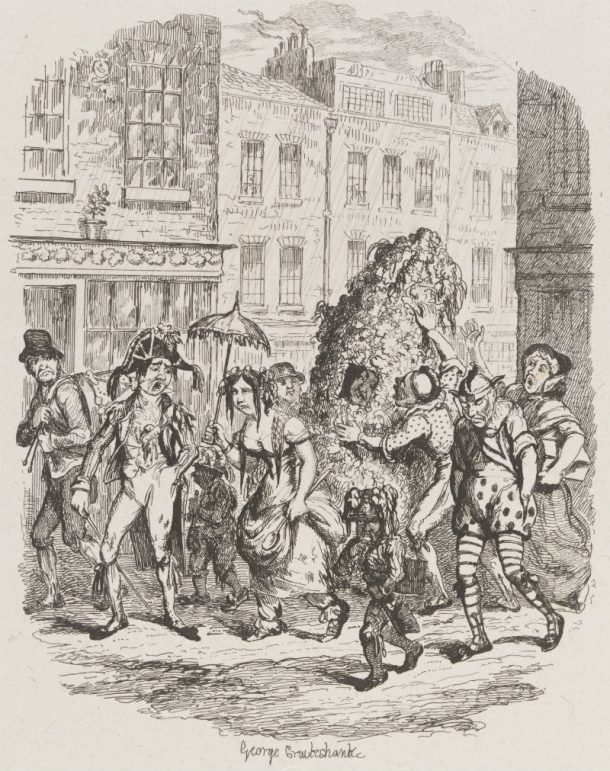
Etching by George Cruickshank, ca. 1836
Museum no. 9407:18 © Victoria and Albert Museum, London
However, should we be lucky enough to have a sunny day this poster from London Underground presents us with an idyllic suggestion for our May Day festivities. Harking back to tradition, we can just jump on the tube have a jig around the nearest May Pole.
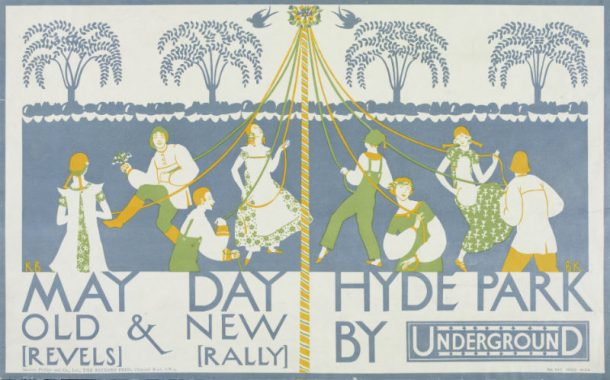
Poster issued by Underground Electric Railways Co. of London, Ltd. 1924
Museum no. E.137-1924,
Presented by the Underground Electric Railways Co. of London, Ltd © Victoria and Albert Museum, London
Or if that is not hedonistically Pagan enough for you perhaps you would prefer a ‘Smoke in and Parade’ in New York’s Central park? Our May Queen will be there with Pan to get the Pagan party started. Everyone is welcome, even a ‘suit’ appears to have been freed from his shackles to join the end of the procession.
Jay Day was part of a campaign of tongue in cheek events staged by the Youth International Party (Yippie), including nominating a pig for President. Perhaps that is him on drums?
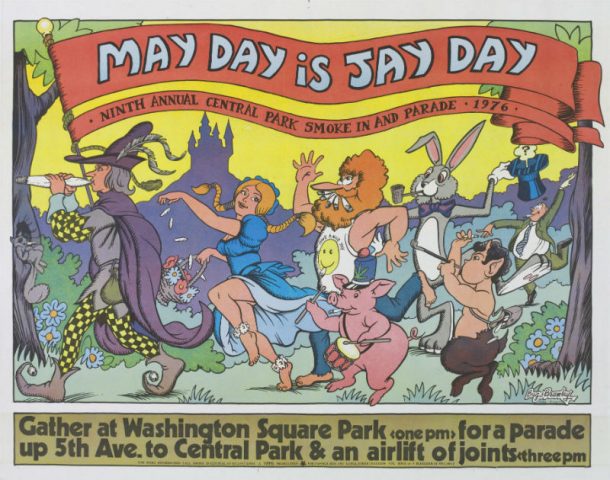
May Day is Jay Day
Poster by Bugs Bramley for Yippie, 1976
Museum no. E.324-2004
Gift of the American Friends of the V&A; Gift to the American Friends by Leslie, Judith and Gabri Schreyer and Alice Schreyer Batko © Victoria and Albert Museum, London
Yippie were sometimes dismissed as a group of mischief makers, however, they did have a serious political agenda. Borne from the Anti War and American hippie movements these counter cultural ‘happenings’ were their challenge to conservatism in 1960s America.
Which leads me to the final part of this post…
May Day events by Anti-Capitalist Groups, Trade Unions and Anarchists are now as familiar as the ancient Maypole or May Queen. The first International Workers May Day was held in the 1890s to champion workers rights and protest against exploitation under Capitalism. The movement quickly gathered speed and it was under this guise that May Day was officially designated a public holiday in Communist countries.
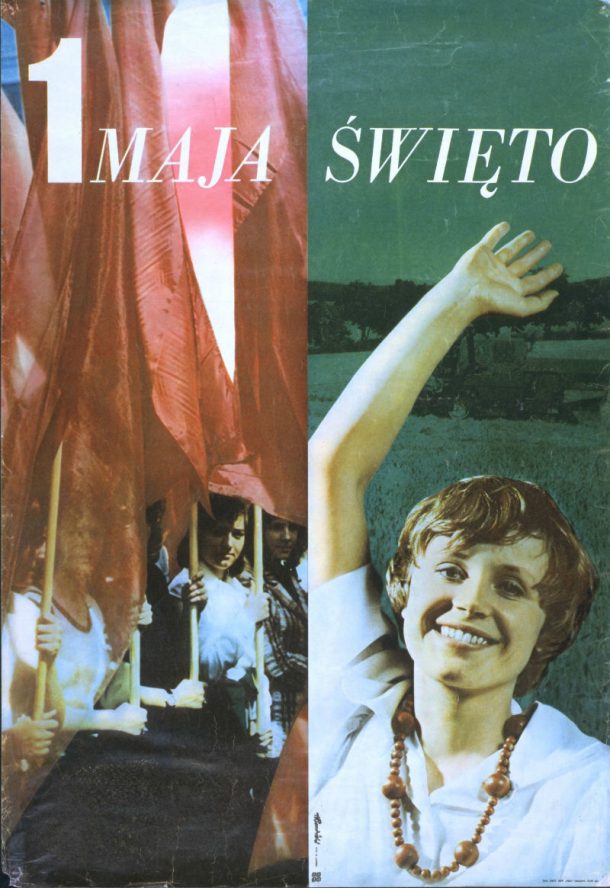
Poster produced by the Polish Communist Party; Poland, 1976
Museum no. E.135-1994 © Victoria and Albert Museum, London
Even in Britain May Day managed to get itself a namesake ‘May Day Manifesto‘ (1967). The document was a riposte to what its authors viewed as the British Labour government’s surrendering of Socialist values.
However, for all the serious political ambition it is still a good excuse for a party.
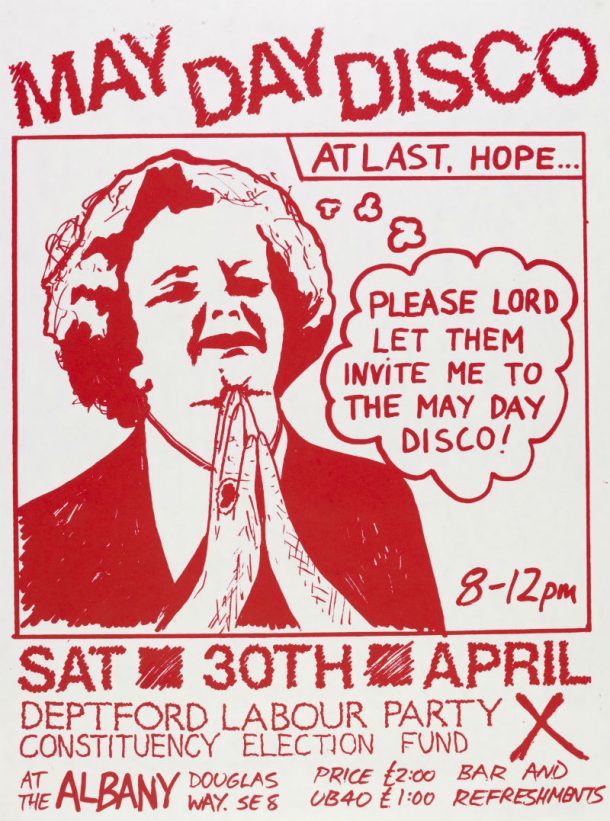
May Day Disco
Poster by The Greenwich Mural Workshop, ca. 1975-1984
Museum no. E.141-2011
Given by Greenwich Mural Workshop © Victoria and Albert Museum, London
May Day, how will you spend yours?
For more information on the objects in this post you can go to Search the Collections on our website or see them in our Print Study Room by appointment.

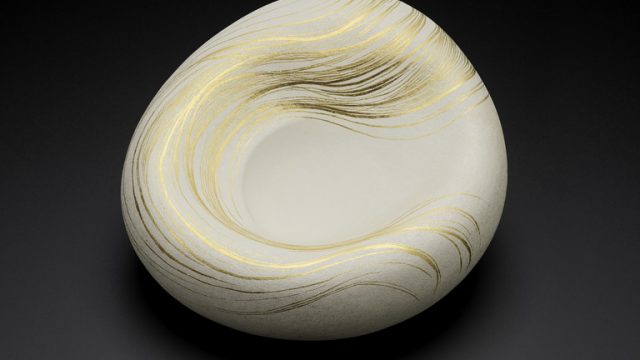


Hello
I’m organising a processional event on August 15 this year and wondered if you have any contacts for processional musicians I might be able to contact – it’s based around Epping Forest in London.
Kind regards
Chris Jenord
Hi Chris
Thanks for your interest. I am afraid I don’t have any contacts for processional musicians but I did a quick web search for Samba Drummers UK and found lots of processional troupes based in Southern England so that could be a possible avenue for you?